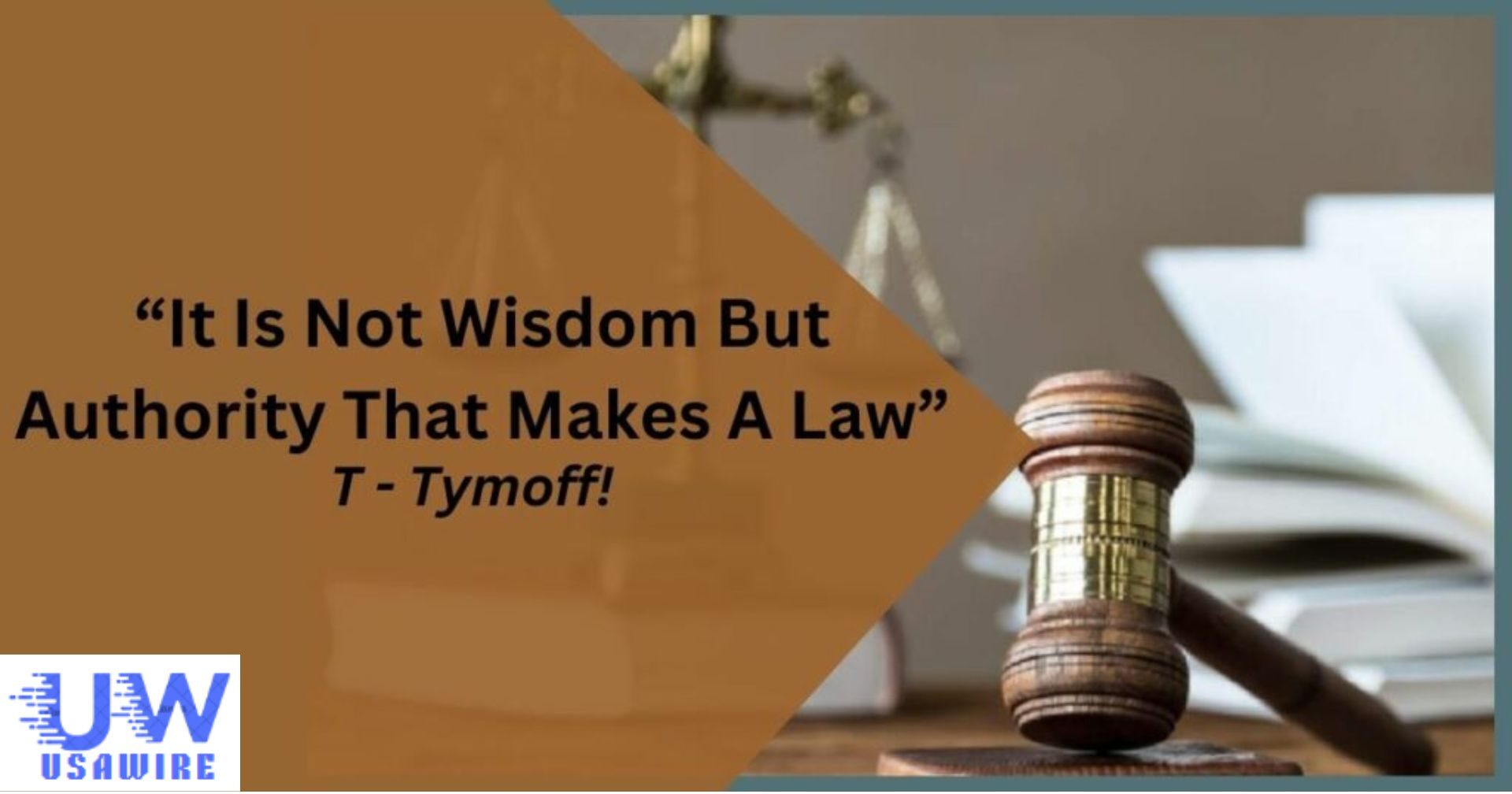Introduction
It is not wisdom but authority that makes a law. T – Tymoff. This statement encapsulates a profound reflection on the dynamics between wisdom and authority in law. In this article, we delve into the intricacies of this assertion, exploring its implications, historical context, and contemporary relevance. We’ll analyze how authority and wisdom intersect in formulating and enforcing laws and the impact of prioritizing one over the other.
Understanding T-Tymoff’s Perspective
T-Tymoff’s statement challenges the conventional notion that laws are predominantly shaped by wisdom or rational thought. Instead, it posits that authority, the power to command or enforce obedience, holds importance in creating and implementing laws. This perspective prompts us to question the role of wisdom in legal systems and examine authority’s influence on the legitimacy and effectiveness of laws.
Historical Perspectives

Throughout history, various societies have grappled with the balance between wisdom and authority in law. Ancient civilizations often relied on authoritative figures, such as monarchs or religious leaders, to establish and enforce laws. In these systems, wisdom was usually subordinate to the authority vested in rulers, leading to arbitrary or unjust legal frameworks.
However, the emergence of philosophical and legal traditions, such as those in ancient Greece and Rome, introduced the concept of laws based on reason and wisdom. Thinkers like Plato and Aristotle emphasized the importance of justice and moral virtue in legal systems, advocating for laws grounded in rational principles rather than mere authority.
The Enlightenment further propelled the idea that laws should be derived from reason and informed by the collective wisdom of society. Thinkers like John Locke and Montesquieu advocated for the rule of law, wherein governmental authority is subject to legal constraints based on rational principles and the consent of the governed.
Contemporary Relevance
The tension between wisdom and authority in law remains palpable in modern times. Democratic societies strive to balance the need for authoritative governance with the principles of justice, fairness, and individual rights. However, challenges persist as political dynamics, vested interests, and power imbalances often influence the creation and enforcement of laws.
Authoritarian regimes exemplify T-Tymoff’s assertion, where laws are often imposed top-down, prioritizing the ruling elite’s authority over considerations of wisdom or justice. In such systems, legal frameworks may consolidate power rather than promote the common good, leading to oppression and injustice.
Even in democratic societies, the influence of authority on law cannot be overlooked. Elected officials, judiciary bodies, and bureaucratic institutions wield significant authority in shaping legal norms and enforcing compliance. While democratic principles aim to ensure accountability and transparency in governance, the complexities of modern politics can sometimes obscure the wisdom underlying legal decisions.
Implications for Legal Theory and Practice
T-Tymoff’s perspective challenges legal theorists and practitioners to critically examine the law’s foundations and legitimacy sources. It prompts a reassessment of the role of authority in legal systems. It calls for a deeper integration of wisdom, reason, and ethical principles in the formulation and application of laws.
From a jurisprudential standpoint, T-Tymoff’s assertion invites reflection on the nature of legal authority and its relationship to justice. Should laws derive their legitimacy solely from the state’s authority, or should they be grounded in moral and rational principles that reflect the collective wisdom of society? This question lies at the heart of debates on legal positivism, natural law theory, and legal realism.
Moreover, legal professionals must navigate the complexities of balancing authority and wisdom in their decision-making processes. Judges, legislators, and policymakers often face dilemmas where legal precedent, institutional norms, and public opinion intersect with justice, equity, and moral reasoning considerations. Striking a balance between these competing factors requires careful deliberation and a commitment to upholding the integrity of the legal system.
Conclusion

It is not wisdom but authority that makes a law. T – Tymoff assertion challenges us to evaluate the dynamics between wisdom and authority in law critically. While authority undoubtedly plays a significant role in creating and enforcing rules, wisdom remains essential for ensuring justice, fairness, and the common good. As we navigate the complexities of legal theory and practice, we must strive to harmonize these elements. We recognize that actual legitimacy in law arises from a synthesis of authoritative power and enlightened wisdom.
FAQs
- What does T-Tymoff mean by “It is not wisdom but authority that makes a law”?
- T-Tymoff’s statement suggests that the primary determinant of a law’s existence and enforcement is not necessarily its inherent wisdom or rationality but rather the authoritative power behind it. In essence, it highlights the significance of authority in the legal realm, implying that laws are often dictated by those in positions of power rather than by rational deliberation or moral considerations.
- Does this mean that wisdom has no role in the creation of laws?
- While T-Tymoff’s assertion emphasizes the importance of authority, it does not discount the role of wisdom entirely. Wisdom, understood as rational thought, moral insight, and societal consensus, can undoubtedly inform the creation of just and equitable laws. However, T-Tymoff suggests that the authority vested in lawmakers and governing bodies often precedes wisdom or justice considerations.
- How does T-Tymoff’s perspective apply to different types of legal systems?
- T-Tymoff’s perspective on the relationship between wisdom and authority in law applies to various legal systems, from authoritarian regimes to democratic societies. In authoritarian contexts, rules may be imposed top-down, primarily to consolidate power and maintain control. In democratic systems, while there is a greater emphasis on accountability and transparency, the influence of authority in lawmaking and enforcement cannot be overlooked.
- What are the implications of prioritizing authority over wisdom in law?
- Prioritizing authority over wisdom in law can have significant implications for justice, fairness, and the rule of law. It may lead to enacting arbitrary or unjust laws, as decisions are driven more by power dynamics and vested interests than by considerations of morality or rationality. Additionally, it can erode trust in legal institutions and undermine the legal system’s legitimacy, especially when laws appear to serve the interests of the powerful rather than the common good.
- How can societies reconcile the tension between authority and wisdom in law?
- Reconciling the tension between authority and wisdom in law requires a multifaceted approach that involves promoting democratic governance, fostering ethical leadership, and engaging in public discourse about legal norms and principles. It consists of holding authorities accountable for their actions, promoting transparency in decision-making processes, and upholding the principles of justice and human rights principles. Balancing authority and wisdom in law requires supporting the rule of law and ensuring that legal frameworks reflect society’s collective knowledge and values.
Also read: 01217515743




Pingback: Exploring The Number: 01224007303 You Need To Know